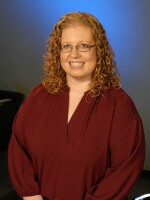A fountain trickles. Zen music plays quietly. Dim lighting illuminates comfortable seating, a beverage center and books and artwork for inspiration.
When Tunkhannock Primary Center teachers and staff feel stressed, overwhelmed or anxious, they can recharge in a repurposed mailroom.
“We focus a lot on children's mental health and what we can do for them, and I'd like to implement something that we can do for our teachers as well,” said second grade teacher Stacy Bevan, who created the new room. “If we can take care of our teachers, we can also take care of our students at the same time.”

Bevan is a member of the Leadership Northeast Impact Class of 2025, a program designed to empower teachers to be agents of positive change within their schools. The recharge room, which serves as her project for the group, was partially inspired by her own research and experience.
She recently finished her doctorate in educational leadership, and for her dissertation studied the COVID-19 pandemic’s impact on teacher mental health. She looked at burnout, retention and why some people have decided not to pursue careers in education.
A 2024 Pew Research Center survey found that 77% of teachers said their job was frequently stressful, and 68% said it was overwhelming. More than four in 10 workers in kindergarten through 12th grade education say they "always" or "very often" feel burned out at work, outpacing all other industries nationally, according to a 2022 Gallup poll.
Bevan wanted to help her colleagues. With the district’s permission, she sought donations and received sponsorships.
Leadership Northeast’s Impact program launched in 2015.
“The whole intention is to really get educators out of the classroom into the community, so they can understand what is happening from a systemic viewpoint … and how do their roles as educators factor into everything that the workforce needs, everything that the community needs,” said Jessica Cronauer, executive director of Leadership Northeast.
Since then, about 200 educators have completed the program, along with school impact projects. Those projects have included developing curriculum, organizing wellness fairs, building outdoor classrooms and providing teachers a way to recharge.
Staff from the program visited the recharge room last week, marveling at its features — the ice machine, the massage chairs, the selection of candy and snacks.

The room opened earlier this month, with staff visiting during lunch breaks and planning periods. She hopes to create a similar room for students and to create an outdoor area for staff.
“Just hearing the music, just hearing the water fountain, seeing the light … you can just catch your breath, and then you can just reset, recharge,” Bevan said. “You can just skip off to a space and find ‘your why’ again.”









